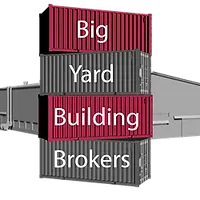Triten Real Estate Looks To Buy Outdoor Industrial Storage Sites Across the Country
A Texas real estate firm, Triten Real Estate Partners, is betting that demand for industrial service facilities, also known as outdoor storage areas, could grow. (Getty
Images)
By Marissa Luck
CoStar News
While most investors have been snatching up small last-mile delivery stations and big e-commerce warehouses, there is
another niche industrial asset class becoming increasingly important in the age of super-fast shipping: outdoor storage
areas.
Also known as industrial service facilities, or ISF for short, the sites are usually built close to large airports, ports,
railroads and major highways and typically are mostly concrete, with less than 20% of the property covered by a
building. Tenants use the space to store and sort products, equipment, building materials, containers, trailers and
trucks, making the properties an important link in the logistics supply chain.
Triten Real Estate Partners, a real estate rm with Houston and Dallas ofces, has been building a portfolio of ISF
properties comprising 160 acres over the past 18 months. Triten Real Estate secured a $150 million investment from an
undisclosed institutional investor and plans to buy about $400 million of ISF properties across the country in the next
three years, becoming a dominant player in the niche sector to ride the wave of the e-commerce boom, particularly
during the pandemic.
ISF properties are usually owned by occupiers, so it’s not common for one real estate investor to collect a portfolio of ISF
properties as part of a large national portfolio, said Scott Arnoldy, founder of Triten Real Estate, in an interview.
Other real estate companies such as Industrial Outdoor Ventures of Chicago and Alterra Property out of Philadelphia are
also active in owning ISF properties, which are sometimes called outdoor storage facilities or industrial outdoor storage.
Industrial Outdoor Ventures describes itself as the only national investor specializing in outdoor storage facilities.
Meanwhile, Alterra’s industrial outdoor storage platform has acquired about $250 million of ISF sites across 50
properties, according to its website. “There is a whole ecosystem revolving around trucks, trailers, parking and chassis and container yards that is under our
nose in plain sight,” said Arnoldy. “It’s just an incrementally fragmented asset class that the brokerage community is
not very deep in. There are not a lot of people that work in it.”
Triten Real Estate is under contract to buy $50 million of ISF properties spread across Atlanta, Georgia; Chicago,
Illinois; Columbus, Ohio; the Dallas-Fort Worth area in Texas; Denver, Colorado; the Kansas City area; Phoenix,
Arizona; Orlando, Florida; and Southern California, according to the company. The sites include truck terminals,
equipment maintenance elds, trailer yards, eet facilities and other outdoor storage areas.
Arnoldy estimates the scale of the ISF asset class could easily rival the size of the Class A warehouse asset class. Triten
Real Estate estimates there are $115 billion to $130 billion of ISF properties across the country, compared to $45 billion
to $50 billion of Class A warehouse space, citing data from CoStar and the Bureau of Economic Analysis.
Luring Big Investors
Arnoldy argues that institutional capital is underexposed to ISF properties, so Triten Real Estate’s goal is to package the
properties together into a national portfolio of institutional scale.
“It just hasn’t been institutionalized yet. The average size is $7 million to $10 million, so it doesn’t have the scale
institutions want on an individual basis, but collectively it does,” Arnoldy said.
Triten Real Estate’s investment comes as industrial real estate has been one of the most resilient real estate sectors
during the pandemic, thanks to surging online sales. E-commerce sales hit $209.5 billion in the third quarter last year, a
36% jump from the same time last year, according to the U.S. Census Bureau. The rapid rise in e-commerce sales quickly exposed areas where retailers needed to expand, prompting online retailer
Amazon and others to go on a development frenzy. CBRE has estimated that every $1 billion in incremental e-commerce
sales necessitates about 1.25 million square feet of additional warehouse space.
It’s possible that outdoor storage areas serving the warehouse and logistics sector could also become more in demand as
companies try to make their supply chains more exible.
“As industrial users opt to store more inventory to avoid disruptions in the global supply chain, I could see these
relatively versatile properties becoming more popular among users, particularly with vacancy as low as it is among other
last-mile” properties, said Abby Corbett, managing director and senior economist at CoStar, in an email. This subset of
properties could t into the last-mile supply chain and likely would be more valuable depending on their location and
proximity to consumers, port or transportation hub, Corbett said.
E-commerce isn’t the only user of ISF properties. Plastic manufacturers and petrochemical and energy companies could
also tap into these logistics-oriented properties as well. For example, Triten Real Estate has acquired properties in the
southeast Houston area that could serve the major petrochemical complex along the Houston Ship Channel that has
already seen an increase in industrial space demand even during the pandemic. The sites can also serve as maintenance
shops, contractor yards and bulk material distribution sites for big products such as roong materials or lumber.
“We view ISF assets as mission-critical to the speed and efciency of the global supply chain, and the pandemic has only
further underlined the critical role these ISF assets serve,” Arnoldy said.







